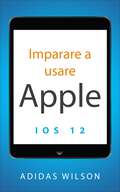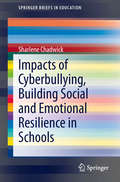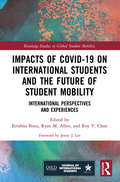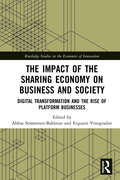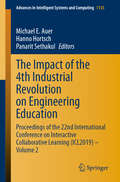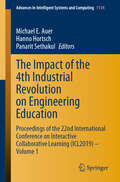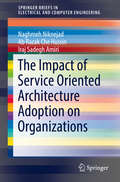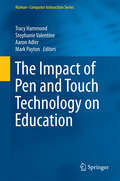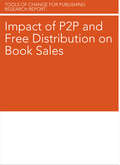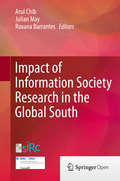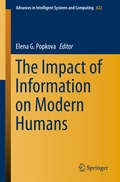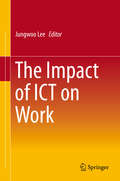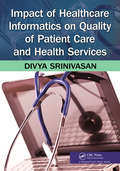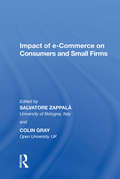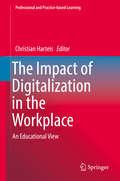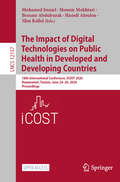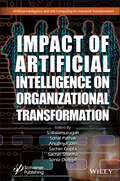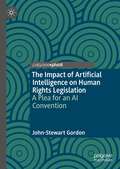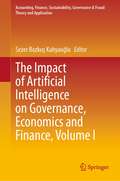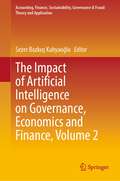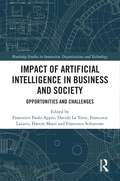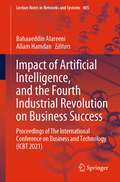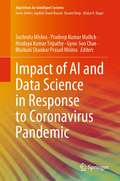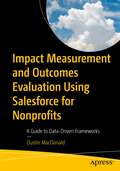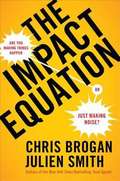- Table View
- List View
Imparare a usare Apple iOS 12
by Adidas WilsonApple ha svelato la nuova versione di iOS, iOS 12. La versione è disponibile gratuitamente sia per iPad che per iPhone dalla fine del 2018. Di seguito sono riportate alcune delle migliori funzionalità che puoi sperimentare con la nuova versione. Apple ha confermato che raddoppierà le prestazioni per aumentare la velocità e la reattività di iPad e iPhone. Hai già impostato il tuo iPad ma non sai quale passo fare dopo? I nuovi utenti di iPad di solito non sanno come trovare e installare buone app, organizzarle o eliminarle. Anche se conosci le basi, potresti aver bisogno di alcuni trucchi per ottenere il massimo dal tuo iPad. Gran parte della navigazione viene eseguita tramite gesti tattili come toccare un'app per avviarla o far scorrere il dito.
Impacts of Cyberbullying, Building Social and Emotional Resilience in Schools
by Sharlene ChadwickThis volume explores cyberbullying and its impact on young people in schools in detail. It investigates social and emotional resilience and wellbeing in relation to developing protective factors against the impacts of cyberbullying and contains a range of perspectives to deal positively with cyberbullying as well as a summary of international research. Cyberbullying occurs when any means of technology is used to repeatedly and deliberately engage in bullying behaviours with the intent to cause harm to others. Although anyone can be affected, young people who are also being bullied offline are more likely to be the target of cyberbullying. Forms of cyberbullying include: * abusive texts and emails * posting messages or images * imitating and excluding others online * inappropriate image tagging. Cyberbullying differs from face-to-face bullying. * a sense of anonymity for those who bully * can occur 24/7 and is invasive * can have a large audience * difficult to delete comments and images.
Impacts of COVID-19 on International Students and the Future of Student Mobility: International Perspectives and Experiences (Routledge Studies in Global Student Mobility)
by Krishna Bista Roy Y. Chan Ryan M. AllenThis volume uses case studies and students' lived experiences to document the impacts of coronavirus (COVID-19) on international students and explore future challenges and opportunities for student mobility within higher education. Responding to the growing need for new insights and perspectives to improve higher education policy and practice in the era of COVID-19, this text analyses the changing roles and responsibilities of institutions and international education leaders post-2020. Initial chapters highlight key issues for students that have arisen as a result of the global health crisis such as learning, well-being, and the changed emotional, legal, and financial implications of study abroad. Subsequent chapters confront potential longer-term implications of students’ experiences during COVID-19, and provide critical reflection on internationalization and the opportunities that COVID-19 has presented for tertiary education systems around the world to learn from one another. This timely volume will benefit researchers, academics, and educators with an interest in online teaching and e-learning, curriculum design, and more specifically those involved with international and comparative education. Those involved with educational policy and practice, specifically related to pandemic education, will also benefit from this volume.
The Impact of the Sharing Economy on Business and Society: Digital Transformation and the Rise of Platform Businesses (Routledge Studies in the Economics of Innovation)
by Abbas Strømmen-Bakhtiar Evgueni VinogradovThe emergence of new platform business models, notably the sharing economy, is impacting the economy in various ways, altering the structure of many industries, and raising a number of economic and political issues. This book investigates the widespread influence of the sharing economy on businesses and society, as well as examining its underpinning economic principles and development. This volume presents an exhaustive review of the existing knowledge on the sharing economy and addresses several major areas of concern for incumbent businesses. It also explains the business models for those who are interested in embarking on their own ventures and provides an excellent source for further research. It takes an in-depth look at controversial labour policies, such as using labour as self-employed contractors or using regulatory grey areas to expand in markets. It is highly multidisciplinary, establishing links between economics, finance, marketing and consumer behaviour. This contribution on the sharing economy will enable researchers and graduate and doctoral students to expand and improve their understanding of this topic and identify new research problems in all of these areas. The book will also appeal to policy makers, regional and local government decision makers, and those interested in labour markets transformation.
The Impact of the 4th Industrial Revolution on Engineering Education: Proceedings of the 22nd International Conference on Interactive Collaborative Learning (ICL2019) – Volume 2 (Advances in Intelligent Systems and Computing #1135)
by Michael E. Auer Hanno Hortsch Panarit SethakulThis book gathers papers presented at the 22nd International Conference on Interactive Collaborative Learning (ICL2019), which was held in Bangkok, Thailand, from 25 to 27 September 2019. Covering various fields of e-learning and distance learning, course and curriculum development, knowledge management and learning, real-world learning experiences, evaluation and outcomes assessment, computer-aided language learning, vocational education development and technical teacher training, the contributions focus on innovative ways in which higher education can respond to the real-world challenges related to the current transformation in the development of education. Since it was established, in 1998, the ICL conference has been devoted to new approaches in learning with a focus on collaborative learning. Today, it is a forum for sharing trends and research findings as well as presenting practical experiences in learning and engineering pedagogy. The book appeals to policymakers, academics, educators, researchers in pedagogy and learning theory, school teachers, and other professionals in the learning industry, and further and continuing education.
The Impact of the 4th Industrial Revolution on Engineering Education: Proceedings of the 22nd International Conference on Interactive Collaborative Learning (ICL2019) – Volume 1 (Advances in Intelligent Systems and Computing #1134)
by Michael E. Auer Hanno Hortsch Panarit SethakulThis book gathers papers presented at the 22nd International Conference on Interactive Collaborative Learning (ICL2019), which was held in Bangkok, Thailand, from 25 to 27 September 2019. Covering various fields of interactive and collaborative learning, new learning models and applications, research in engineering pedagogy and project-based learning, the contributions focus on innovative ways in which higher education can respond to the real-world challenges related to the current transformation in the development of education. Since it was established, in 1998, the ICL conference has been devoted to new approaches in learning with a focus on collaborative learning. Today, it is a forum for sharing trends and research findings as well as presenting practical experiences in learning and engineering pedagogy. The book appeals to policymakers, academics, educators, researchers in pedagogy and learning theory, school teachers, and other professionals in the learning industry, and further and continuing education.
The Impact of Service Oriented Architecture Adoption on Organizations (SpringerBriefs in Electrical and Computer Engineering)
by Naghmeh Niknejad Ab Razak Hussin Iraj Sadegh AmiriThis book describes Service-Oriented Architecture (SOA) and the significant factors which affect its adoption, such as governance, strategy, complexity, Return on Investment (ROI), business and IT alignment, culture and communication, costs, and security. The study on which this book is based, involved a quantitative analysis to investigate the influential factors for adopting SOA, paving the way to further research in the field.
The Impact of Pen and Touch Technology on Education
by Tracy Hammond Stephanie Valentine Aaron Adler Mark PaytonThis book presents perspectives for and by teachers, school and university administrators and educational researchers regarding the great impact pen and tablet technology can have on classrooms and education. presents three distinctly valuable threads of research: Emerging technologies and cutting-edge software invented by researchers and evaluated through real classroom deployments. First-hand perspectives of instructors and administrators who actively implement pen or tablet technologies in their classrooms. Up-and-coming systems that provide insight into the future of pen, touch, and sketch recognition technologies in the classrooms and the curriculums of tomorrow. The Impact of Pen and Touch Technology on Education is an essential read for educators who wish get to grips with ink-based computing and bring their teaching methods into the twenty-first century, as well as for researchers in the areas of education, human-computer interaction and intelligent systems for pedagogical advancement.
Impact of P2P and Free Distribution on Book Sales
by Brian O'LearyBook publishers have long used free content as part of their marketing and selling efforts, with the vast majority of free content distributed in printed form. Digital distribution of free material, either intentional or via unauthorized availability through peer-to-peer sites and other Web outlets, offers a fast and expansive connection to consumers, but content can also be copied and disseminated without publishers' control. Some publishers are torn between the efficiencies digital distribution provides and concerns over piracy and print-sale cannibalization. This research report is part of an ongoing effort by O'Reilly Media Inc. and Random House to test assumptions about free distribution, P2P availability and their potential impact on book sales.
Impact of Information Society Research in the Global South
by Arul Chib Julian May Roxana BarrantesThe second volume in the SIRCA book series investigates the impact of information society initiatives by extending the boundaries of academic research into the realm of practice. Global in scope, it includes contributions and research projects from Asia, Africa and Latin America. The international scholarly community has taken a variety of approaches to question the impact of information society initiatives on populations in the Global South. This book addresses two aspects-- Impact of research: How is the research on ICTs in the Global South playing a role in creating an information society? (e. g. policy formulation, media coverage, implementation in practice) and Research on impact: What is the evidence for the impact of ICTs on society? (i. e. the objectives of socio-economic development). This volume brings together a multiplicity of voices and approaches from social scientific research to produce an engaging volume for a variety of stakeholders including academics, researchers, practitioners, policy-makers and those in the business and civil sectors of society.
The Impact of Information on Modern Humans (Advances In Intelligent Systems And Computing #622)
by Elena G. PopkovaThis book features contributions from various spheres of socio-humanitarian sciences presented at the scientific and practical conference on “Humans as an Object of Study by Modern Science,” which took place in Nizhny Novgorod (Russian Federation) on November 23–24, 2017. The conference was organized by Kozma Minin Nizhny Novgorod State Pedagogical University and the non-profit organization “Institute of Scientific Communications.” Presenting the results of multidisciplinary studies as well as new approaches, the target audience of the book includes postgraduates, lecturers at higher educational establishments, and researchers studying socio-humanitarian sciences. The complex study of humans by representatives of various socio-humanitarian sciences (philosophy, pedagogics, jurisprudence, social sciences, and economics) allows a comprehensive concept of the field to be developed. Selecting humans as an object of research opens wide possibilities for studying various issues related to their activities, while considering humans within multiple sciences means that the methods of induction and deduction can be combined to achieve precise results. This book includes the results of leading scientific studies on the following key issues: establishment of an information economy under the influence of scientific and technical progress: new challenges and opportunities; information and communication technologies as a new vector of development of the modern world economy; specifics and experience of using new information and communication technologies in developed and developing countries; problems of implementing new information and communication technologies in the modern economy; and priorities of using new information and communication technologies in the modern economy.
The Impact of ICT on Work
by Jungwoo LeeThis edited volume presents current perspectives on the innovative use of Information and Communication Technologies (ICT) as an integral part of the changing nature of work. The individual chapters address a number of key concepts such as telecommuting, alternative work arrangements, job crafting, gamification and new work skills, supplemented by a range of examples and supporting case studies. The Impact of ICT on Work offers a valuable resource for business practitioners and academics in the areas of information systems, as well as for human resources managers. The book will also be useful in advanced graduate classes dealing with the social and business impacts of information and communication technologies.
Impact of Healthcare Informatics on Quality of Patient Care and Health Services
by Divya Srinivasan SridharRecent healthcare reform and its provisions have pushed health information technology (HIT) into the forefront. Higher life expectancies, fewer medical errors, lower costs, and improved transparency are all possible through HIT.Taking an integrated approach, Impact of Healthcare Informatics on Quality of Patient Care and Health Services examines th
Impact of e-Commerce on Consumers and Small Firms
by Salvatore ZappalaThe change from old to new technologies has fundamentally changed the relationship between the consumer and the firm. This book is at the frontier of behavioural research into how these new commercial realities are borne out in practice, examining the adoption of e-commerce by small firms and the transactional phenomenon that entails access to the Internet. In analyzing the process of e-commerce adoption and why e-commerce actors behave as they do, its coverage includes the adoption of information and communication technologies (ICT) by small firms; the use of ICT applications to support marketing and sales transactions; and the factors that influence consumers' online purchasing decisions.
The Impact of Digitalization in the Workplace: An Educational View (Professional and Practice-based Learning #21)
by Christian HarteisThis edited volume brings together researchers from various disciplines (i.e. education, psychology, sociology, economy, information technology, engineering) discussing elementary changes at workplaces occurring through digitalization, and reflecting on educational challenges for individuals, organizations, and society. The latest developments in information and communication technology seem to open new potential, and the crucial question arises which kind of work can be replaced by technology? The contributors to this volume are scholars who have been conducting research on the influence of technological change on work and individuals for a long time. The book addresses researchers as well as practitioners in the field of adult education and human resource development.
The Impact of Digital Technologies on Public Health in Developed and Developing Countries: 18th International Conference, ICOST 2020, Hammamet, Tunisia, June 24–26, 2020, Proceedings (Lecture Notes in Computer Science #12157)
by Mohamed Jmaiel Mounir Mokhtari Bessam Abdulrazak Hamdi Aloulou Slim KallelThis open access book constitutes the refereed proceedings of the 18th International Conference on String Processing and Information Retrieval, ICOST 2020, held in Hammamet, Tunisia, in June 2020.* The 17 full papers and 23 short papers presented in this volume were carefully reviewed and selected from 49 submissions. They cover topics such as: IoT and AI solutions for e-health; biomedical and health informatics; behavior and activity monitoring; behavior and activity monitoring; and wellbeing technology.*This conference was held virtually due to the COVID-19 pandemic.
Impact of Artificial Intelligence on Organizational Transformation (Artificial Intelligence and Soft Computing for Industrial Transformation)
by S. Balamurugan Sonal Pathak Anupriya Jain Sachin Gupta Sachin Sharma Sonia DuggalIMPACT OF ARTIFICIAL INTELLIGENCE ON ORGANIZATIONAL TRANSFORMATION Discusses the impact of AI on organizational transformation which is a mix of computational techniques and management practices, with in-depth analysis about the role of automation & data management, and strategic management in relation to human capital, procurement & production, finance, and marketing. The impact of AI in restructuring organizational processes is a combination of management practices and computational technology. This book covers the areas like artificial intelligence & its impact on professions, as well as machine learning algorithms and technologies. The context of applications of AI in business process innovation primarily includes new business models, AI readiness and maturity at the organizational, technological, financial, and cultural levels. The book has extensive details on machine learning and the applications such as robotics, blockchain, Internet of Things. Also discussed are the influence of AI on financial strategies and policies, human skills & values, procurement innovation, production innovation, AI in marketing & sales platforms. Audience Readers include those working in artificial intelligence, business management studies, technology engineers, senior executives, and human resource managers in all types of business.
The Impact of Artificial Intelligence on Human Rights Legislation: A Plea for an AI Convention
by John-Stewart GordonThe unmatched technological achievements in artificial intelligence (AI), robotics, computer science, and related fields over the last few decades can be considered a success story. The technological sophistication has been so groundbreaking in various types of applications that many experts believe that we will see, at some point or another, the emergence of general AI (AGI) and, eventually, superintelligence. This book examines the impact of AI on human rights by focusing on potential risks and human rights legislation and proposes creating a Universal Convention for the Rights of AI Systems (AI Convention).
The Impact of Artificial Intelligence on Governance, Economics and Finance, Volume I (Accounting, Finance, Sustainability, Governance & Fraud: Theory and Application)
by Sezer Bozkuş KahyaoğluThe book discusses the effects of artificial intelligence in terms of economics and finance. In particular, the book focuses on the effects of the change in the structure of financial markets, institutions and central banks, along with digitalization analyzed based on fintech ecosystems. In addition to finance sectors, other sectors, such as health, logistics, and industry 4.0, all of which are undergoing an artificial intelligence induced rapid transformation, are addressed in this book.Readers will receive an understanding of an integrated approach towards the use of artificial intelligence across various industries and disciplines with a vision to address the strategic issues and priorities in the dynamic business environment in order to facilitate decision-making processes. Economists, board members of central banks, bankers, financial analysts, regulatory authorities, accounting and finance professionals, chief executive officers, chief audit officers and chief financial officers, chief financial officers, as well as business and management academic researchers, will benefit from reading this book.
The Impact of Artificial Intelligence on Governance, Economics and Finance, Volume 2 (Accounting, Finance, Sustainability, Governance & Fraud: Theory and Application)
by Sezer Bozkuş KahyaoğluThis book continues the discussion of the effects of artificial intelligence in terms of economics and finance. In particular, the book focuses on the effects of the change in the structure of financial markets, institutions and central banks, along with digitalization analyzed based on fintech ecosystems. In addition to finance sectors, other sectors, such as health, logistics, and industry 4.0, all of which are undergoing an artificial intelligence induced rapid transformation, are addressed in this book.Readers will receive an understanding of an integrated approach towards the use of artificial intelligence across various industries and disciplines with a vision to address the strategic issues and priorities in the dynamic business environment in order to facilitate decision-making processes. Economists, board members of central banks, bankers, financial analysts, regulatory authorities, accounting and finance professionals, chief executive officers, chief audit officers and chief financial officers, chief financial officers, as well as business and management academic researchers, will benefit from reading this book.
Impact of Artificial Intelligence in Business and Society: Opportunities and Challenges (Routledge Studies in Innovation, Organizations and Technology)
by Francesco Paolo Appio Davide La Torre Francesca Lazzeri Hatem Masri Francesco SchiavoneBelonging to the realm of intelligent technologies, it is increasingly accepted that artificial intelligence (AI) has evolved from being merely a development standpoint in computer science. Indeed, recent reports and academic publications show that we are clearly on the path toward pervasive AI in both business and society. Organizations must adopt AI to maintain a competitive advantage and explore opportunities for unprecedented innovation. This book focuses on understanding the wide range of opportunities as well as the spectrum of challenges AI brings in different business contexts and society at large. The book highlights novel and high-quality research in data science and business analytics and examines the current and future impact of AI in business and society. The authors bridge the gap between business and technical perspectives and demonstrate the potential (and actual) impact on society. Embracing applied, qualitative, and quantitative research as well as field experiments and data analysis, the book covers a broad range of topics including but not limited to human-centered AI, product and process innovation, corporate governance, AI and ethics, organizational performance, and entrepreneurship. This comprehensive book will be a valuable resource for researchers, academics, and postgraduate students across AI, technology and innovation management, and a wide range of business disciplines.
Impact of Artificial Intelligence, and the Fourth Industrial Revolution on Business Success: Proceedings of The International Conference on Business and Technology (ICBT 2021) (Lecture Notes in Networks and Systems #485)
by Bahaaeddin Alareeni Allam HamdanThis book constitutes the refereed proceedings of the International Conference on Business and Technology (ICBT2021) organized by EuroMid Academy of Business & Technology (EMABT), held in Istanbul, between 06–07 November 2021. In response to the call for papers for ICBT2021, 485 papers were submitted for presentation and inclusion in the proceedings of the conference. After a careful blind refereeing process, 292 papers were selected for inclusion in the conference proceedings from forty countries. Each of these chapters was evaluated through an editorial board, and each chapter was passed through a double-blind peer-review process.The book highlights a range of topics in the fields of technology, entrepreneurship, business administration, accounting, and economics that can contribute to business development in countries, such as learning machines, artificial intelligence, big data, deep learning, game-based learning, management information system, accounting information system, knowledge management, entrepreneurship, and social enterprise, corporate social responsibility and sustainability, business policy and strategic management, international management and organizations, organizational behavior and HRM, operations management and logistics research, controversial issues in management and organizations, turnaround, corporate entrepreneurship, innovation, legal issues, business ethics, and firm gerial accounting and firm financial affairs, non-traditional research, and creative methodologies.These proceedings are reflecting quality research contributing theoretical and practical implications, for those who are wise to apply the technology within any business sector. It is our hope that the contribution of this book proceedings will be of the academic level which even decision-makers in the various economic and executive-level will get to appreciate.
Impact of AI and Data Science in Response to Coronavirus Pandemic (Algorithms for Intelligent Systems)
by Sushruta Mishra Pradeep Kumar Mallick Hrudaya Kumar Tripathy Gyoo-Soo Chae Bhabani Shankar Prasad MishraThe book presents advanced AI based technologies in dealing with COVID-19 outbreak and provides an in-depth analysis of variety of COVID-19 datasets throughout globe. It discusses recent artificial intelligence based algorithms and models for data analysis of COVID-19 symptoms and its possible remedies. It provides a unique opportunity to present the work on state-of-the-art of modern artificial intelligence tools and technologies to track and forecast COVID-19 cases. It indicates insights and viewpoints from scholars regarding risk and resilience analytics for policy making and operations of large-scale systems on this epidemic. A snapshot of the latest architectures, frameworks in machine learning and data science are also highlighted to gather and aggregate data records related to COVID-19 and to diagnose the virus. It delivers significant research outcomes and inspiring new real-world applications with respect to feasible AI based solutions in COVID-19 outbreak. In addition, it discusses strong preventive measures to control such pandemic.
Impact Measurement and Outcomes Evaluation Using Salesforce for Nonprofits: A Guide to Data-Driven Frameworks
by Dustin MacDonaldConduct impact measurement and outcomes evaluation, with a specific focus on nonprofits, using Salesforce Nonprofit Cloud (aka Salesforce for Nonprofits). As funding grows more challenging for nonprofits, having a robust technology system in place allows nonprofits to better seek out funding and receive more when they do. Readers of this book will be better positioned to ensure the long-term success of their organization and make maximum use of their technology. The book begins with an introduction to Salesforce and to Nonprofit Cloud for users who may be new to the platform. Next, you will learn the fundamentals of impact measurement and outcomes evaluation. You will understand why these are important and discover several frameworks that can be used to select outcomes that make sense for your organization to prove that its work is successful. These frameworks include Social Return on Investment (SROI), Cost-Benefit Analysis (CBA), and Pre and Post Comparison (and others). You will use your chosen framework to develop a logic model or theory of change which demonstrates how the work that nonprofits do translates into the outputs and outcomes that clients experience and that nonprofits seek funding to deliver. After covering the theory, author Dustin MacDonald teaches you how to translate the framework you chose into Salesforce. You will learn how to create reports, dashboards, formula fields, roll up summaries, and other basic Salesforce tools in order to collect the information you need to validate your framework. This book also demonstrates how to report on the outcomes you have achieved, tweak results to improve performance, and see the entire end-to-end experience in practice through a set of case studies. The book concludes with a discussion of advanced tools and techniques available inside Salesforce, such as Einstein Prediction Builder, as well as information on how you can immediately apply what you have learned to your own organization. What You Will Learn Understand how to use Nonprofit Cloud to collect and analyze dataKnow how to create a theory of change that shows your impactBecome adept at working with impact measurement frameworksBuild everything you need in Salesforce without writing a single line of codeTurn your insights into new funding to keep your organization strong Who This Book Is For Salesforce administrators, nonprofit staff members, and others working at nonprofits who are required to conduct impact measurement and outcomes evaluation. Additionally, business analysts and technical architects who are designing and implementing solutions for nonprofits at implementation partners will benefit from this book.
The Impact Equation: Are You Making Things Happen or Just Making Noise?
by Chris Brogan Julien SmithChris Brogan and Julien Smith, authors of Trust Agents, are back with The Impact Equation to show you how to make social media pay. What can the IMPACT EQUATION do for you? IMPACT = C × (R+E+A+T+E) Contrast: Does your idea stand out? Reach: How many people do you connect to? Exposure: How often does your audience hear from you? Articulation: Is your idea clear enough? Trust: Do people believe you? Echo: Does your idea connect to your audience? When Chris Brogan and Julien Smith wrote their bestseller Trust Agents, being interesting on the Web was enough to build an audience. Now everybody has a platform. But most of them are just making noise. In The Impact Equation, Brogan and Smith show that to make people truly care about what you have to say, you need more than just a good idea, trust among your audience, or a certain number of followers. You need a potent mix of all of the above - and more. As traditional channels for marketing and selling disappear and more people interact mainly online, the very nature of attention is changing. Use the Impact Equation to figure out what you're doing right and wrong. Apply it to a blog, a tweet, a video, or a mainstream advertising campaign. Use it to explain why a feature in a national newspaper that reaches millions might have less impact than a blog post that reaches a thousand passionate subscribers. The Impact Equation will give you the tools to guarantee your message will be heard. 'Their advice on the importance of being able to write to make a splash online is solid. . . when it comes to building a brand online Brogan and Smith have been there and done that' -The Financial TimesChris Brogan and Julien Smith are consultants and speakers who have worked with Fortune 500 companies, including PepsiCo, General Motors, American Express, and Microsoft. They have been involved in online communities and blogging for more than fifteen years. Their first book, Trust Agents, was a New York Times bestseller.
